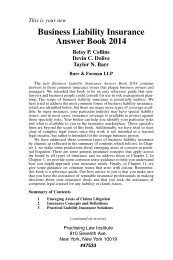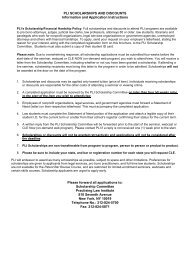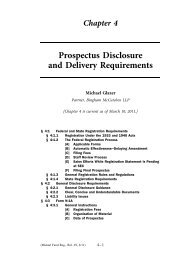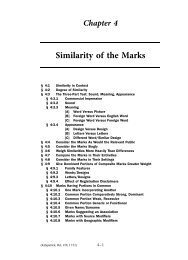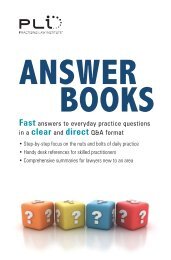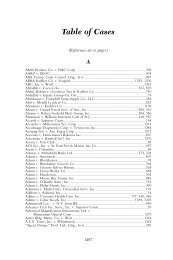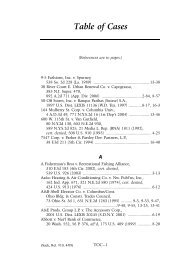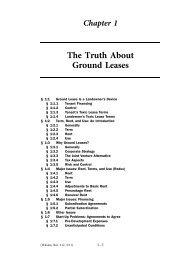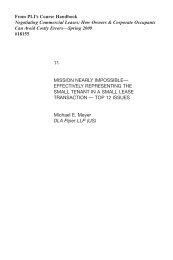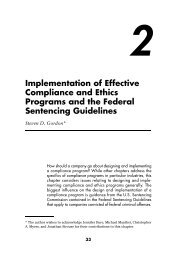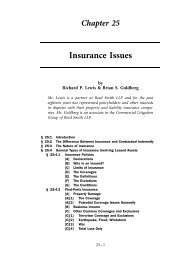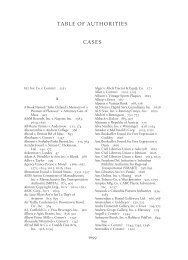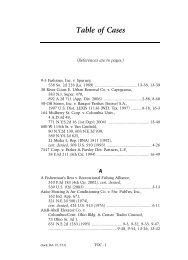Breach of Fiduciary Duty
Breach of Fiduciary Duty
Breach of Fiduciary Duty
You also want an ePaper? Increase the reach of your titles
YUMPU automatically turns print PDFs into web optimized ePapers that Google loves.
<strong>Breach</strong> <strong>of</strong> <strong>Fiduciary</strong> <strong>Duty</strong> § 7:3<br />
(2) in the court’s discretion, an allowance <strong>of</strong> reasonable attorney’s fees<br />
and costs <strong>of</strong> action. 173<br />
§ 7:3 Affirmative Defense: Statute <strong>of</strong> Limitations<br />
A claim against an accountant for breach <strong>of</strong> his or her fiduciary duty<br />
must be brought within the applicable statute <strong>of</strong> limitations, which<br />
varies from jurisdiction to jurisdiction. 174 Thus, the expiration <strong>of</strong> the<br />
statute <strong>of</strong> limitations is an affirmative defense which may be raised by<br />
an accountant charged with a breach <strong>of</strong> fiduciary duty. As with other<br />
affirmative defenses, the defense <strong>of</strong> statute <strong>of</strong> limitations must be set<br />
forth affirmatively in the pleadings. 175<br />
Some courts may apply the continuous representative doctrine<br />
to toll the statute <strong>of</strong> limitations on a breach <strong>of</strong> fiduciary duty claim<br />
against an accountant. 176 In addition, since a fiduciary has a duty to<br />
disclose all relevant facts relating to matters within the scope <strong>of</strong> the<br />
fiduciary relationship, a failure to disclose such facts may toll the<br />
statute <strong>of</strong> limitations. In Russell v. Campbell, 177 an accountant who<br />
was a fiduciary engaged in self-dealing in violation <strong>of</strong> his fiduciary<br />
173. Id. § 1132(g)(1).<br />
174. In New York, there is no “single statute <strong>of</strong> limitations for fiduciary duty<br />
claims. Rather, the choice <strong>of</strong> the applicable limitations period depends<br />
upon the remedy that the plaintiff seeks.” IDT Corp. v. Morgan Stanley<br />
Dean Witter & Co., 12 N.Y.3d 132, 907 N.E.2d 268, 272, reargument<br />
denied, 12 N.Y.3d 889, 911 N.E.2d 855 (2009). Some cases apply the<br />
general tort limitations period to breach <strong>of</strong> fiduciary duty claims. See Kan.<br />
Reinsurance Co. v. Cong. Mortg. Corp., 20 F.3d 1362, 1373 (5th Cir. 1994)<br />
(applying two-year limitation period under Texas law for torts). Others<br />
apply the residual limitation period applicable to actions for which no<br />
limitation period is otherwise prescribed. See Singer v. Dungan, 45 F.3d<br />
823, 827 (4th Cir. 1995) (applying Virginia’s catch-all one-year statute <strong>of</strong><br />
limitations). Where the essence <strong>of</strong> the breach <strong>of</strong> fiduciary duty claim is<br />
pr<strong>of</strong>essional negligence, a court may apply the statute <strong>of</strong> limitations for<br />
pr<strong>of</strong>essional negligence. See Maloley v. Shearson Lehman Hutton, Inc.,<br />
246 Neb. 701, 523 N.W.2d 27 (1994) (suit against investment advisor for<br />
allegedly recommending inappropriate investments). The applicable statute<br />
<strong>of</strong> limitations may vary depending upon the remedy sought. For<br />
example, where the plaintiff seeks to impose a constructive trust, a court<br />
may apply the statute <strong>of</strong> limitations governing the underlying claim; for<br />
example, for recovery <strong>of</strong> real property. See Fleury v. Chrisman, 200 Neb.<br />
584, 264 N.W.2d 839, 844 (1978). Or, it may apply a trust statute <strong>of</strong><br />
limitations. See 1 CALVIN W. CORMAN, LIMITATION OF ACTIONS § 4.5, at<br />
277–78 (1991).<br />
175. See, e.g., FED. R. CIV. P. 8(c).<br />
176. See Morrison v. Watkins, 20 Kan. App. 2d 411, 889 P.2d 140, 148 (1995)<br />
(deciding that cause <strong>of</strong> action accrued when plaintiff discharged<br />
accountant).<br />
177. Russell v. Campbell, 725 S.W.2d 739 (Tex. Ct. App. 1987), writ <strong>of</strong> error<br />
refused.<br />
(Goldwasser & Arnold, Rel. #14, 10/11)<br />
7–33



